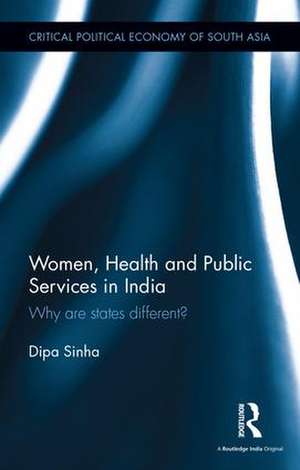Women, Health and Public Services in India: Why are states different?: Critical Political Economy of South Asia
Autor Dipa Sinhaen Limba Engleză Hardback – 20 apr 2016
This book will interest scholars and researchers of sociology, development studies, gender studies, economics, public policy as well as general readers.
| Toate formatele și edițiile | Preț | Express |
|---|---|---|
| Paperback (1) | 407.85 lei 6-8 săpt. | |
| Taylor & Francis – 25 apr 2019 | 407.85 lei 6-8 săpt. | |
| Hardback (1) | 1031.81 lei 6-8 săpt. | |
| Taylor & Francis – 20 apr 2016 | 1031.81 lei 6-8 săpt. |
Preț: 1031.81 lei
Preț vechi: 1258.31 lei
-18% Nou
Puncte Express: 1548
Preț estimativ în valută:
197.53€ • 205.32$ • 163.77£
197.53€ • 205.32$ • 163.77£
Carte tipărită la comandă
Livrare economică 06-20 februarie 25
Preluare comenzi: 021 569.72.76
Specificații
ISBN-13: 9781138648043
ISBN-10: 1138648043
Pagini: 244
Ilustrații: 54
Dimensiuni: 138 x 216 x 18 mm
Greutate: 0.41 kg
Ediția:1
Editura: Taylor & Francis
Colecția Routledge India
Seria Critical Political Economy of South Asia
Locul publicării:Oxford, United Kingdom
ISBN-10: 1138648043
Pagini: 244
Ilustrații: 54
Dimensiuni: 138 x 216 x 18 mm
Greutate: 0.41 kg
Ediția:1
Editura: Taylor & Francis
Colecția Routledge India
Seria Critical Political Economy of South Asia
Locul publicării:Oxford, United Kingdom
Public țintă
PostgraduateCuprins
Acknowledgement List of Tables List of Figures 1. North-South Contrast in Human Development 2. Not Just Economic Conditions 3. Women’s Status is Key 4. Public Provisioning Matters 5. Putting the Puzzle Together 6. The Contrasting Cases of Tamil Nadu and Uttar Pradesh 7. Unpacking Women’s Status in Tamil Nadu and Uttar Pradesh 8. Delivering Public Services Effectively 9. Public Action for Public Services 10. Summing Up and Way Forward Appendix A. Appendix B. Bibliography.
Notă biografică
Dipa Sinha is Assistant Professor (Economics) at Ambedkar University, New Delhi, India. She studied at Jawaharlal Nehru University, New Delhi, and at the School of Oriental and African Studies (SOAS), University of London, UK. She is involved with issues related to public health, nutrition and right to food as a researcher and activist. She has worked in Andhra Pradesh on a project mobilising communities for better maternal and child health and nutrition, supported by a fellowship from the MacArthur Foundation (administered by Population Council). She was later affiliated with the Office of Commissioners to the Supreme Court (on the Right to Food) and has been part of a number of research and implementation projects with the Centre for Equity Studies (CES) and Public Health Resource Network (PHRN), New Delhi, India.
Recenzii
"The contrast in social development between Uttar Pradesh and Tamil Nadu is as sharp as it is intriguing. Through this prism, Dipa Sinha’s insightful study sheds light on many critical aspects of India’s development." — Jean Drèze, Development Economist and Visiting Professor, Ranchi University, Jharkhand, India
"This book is a must for policy makers, public administrators and community workers. Sinha brilliantly unpackages state performance and highlights … the vital importance of women’s freedom, state capacity, public accountability, and intra-family as well as community relationships in promoting human development." — A. K. Shiva Kumar, Economist and Policy Advisor, New Delhi, India
"This book is a must for policy makers, public administrators and community workers. Sinha brilliantly unpackages state performance and highlights … the vital importance of women’s freedom, state capacity, public accountability, and intra-family as well as community relationships in promoting human development." — A. K. Shiva Kumar, Economist and Policy Advisor, New Delhi, India
Descriere
This volume provides a detailed analysis of health outcomes in India especially its effects on women, through a comparative study of Tamil Nadu and Uttar Pradesh. The book provides insights into how multiple factors affecting human development, especially the health aspect, play out differently in different socio-cultural and economic contexts.







